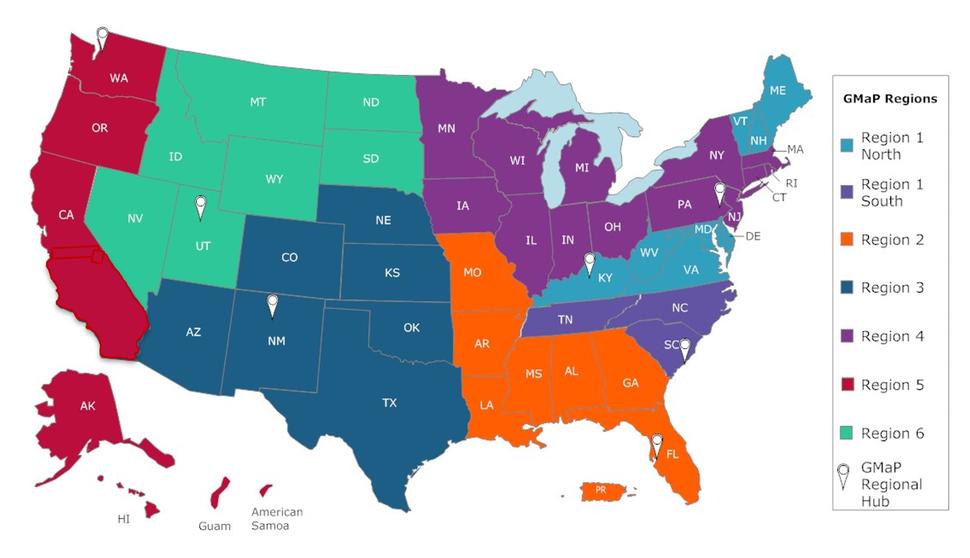Goals and Objectives
The goals of the GMaP initiative are to contribute to the science of CHD and promote the development of the next generation of competitive, underrepresented cancer and CHD investigators.
Consistent with these goals, GMaP seeks to achieve the following objectives:
- Create opportunities for scientific exchange, cooperation, and collaboration among cancer and CHD researchers.
- Attract underrepresented students, trainees, scholars, and investigators to the biomedical cancer enterprise.
- Enhance access of underrepresented students, trainees, and scholars to career development and mentoring opportunities.
- Increase cancer information dissemination and best practice sharing among researchers, trainees, and scholars.
- Build strong relationships with NON CHEs.
Quick Facts
- Seven administrative supplements were awarded to six regions in FY2015 to support existing efforts aimed at the efficient management of CHD research, diversity training, and community education and outreach.
- The GMaP regions bring together researchers, trainees and students, new and early-stage investigators, and community members so they can collectively identify and prioritize region-specific cancer research, training, education and outreach, and faculty development issues.
- GMaP leverages the strengths of its people, programs, and resources to provide greater access to cancer information in health disparity communities and to increase research participation and tissue collection in disparate populations.
GMaP Regions

Region 1 North
The Region 1 North hub is based at the Markey Cancer Center in Lexington, Kentucky. This region serves Delaware, Kentucky, Maryland, Maine, New Hampshire, Vermont, Virginia, West Virginia, and Washington, DC. Visit the Region 1 North website to learn more.
| Role | Name |
|---|---|
| Principal Investigator | B. Mark Evers, University of Kentucky Markey Cancer Center |
| Project Director | Mark Dignan, University of Kentucky Markey Cancer Center |
| Regional Coordinating Director | Erin Oakley, University of Kentucky Markey Cancer Center |
Region 1 South
The Region 1 South hub is based at the Hollings Cancer Center in Charleston, South Carolina. Region 1 South serves North Carolina, South Carolina, and Tennessee. Visit the Region 1 South website to learn more.
| Role | Name |
|---|---|
| Principal Investigator | H. Shelton Earp, UNC Lineberger Comprehensive Cancer Center, University of North Carolina at Chapel Hill |
| Project Director | Stephanie Wheeler, UNC Lineberger Comprehensive Cancer Center, University of North Carolina at Chapel Hill |
| Regional Coordinating Director | Anissa I. Vines, University of North Carolina at Chapel Hill |
Region 2
Region 2’s hub and regional leadership listed below are based at the H. Lee Moffitt Cancer Center & Research Institute in Tampa, Florida. Region 2 serves Alabama, Arkansas, Florida, Georgia, Louisiana, Mississippi, Missouri, and Puerto Rico. Visit the Region 2 website to learn more.
| Role | Name |
|---|---|
| Principal Investigator | John L. Cleveland, Moffitt Cancer Center and Research Institute |
| Project Directors | Cathy D. Meade, Moffitt Cancer Center and Research Institute Clement K. Gwede, Moffitt Cancer Center and Research Institute |
| Regional Coordinating Directors | Z’Kera Sims, Moffitt Cancer Center and Research Institute Vivekka Suppiah, Moffitt Cancer Center and Research Institute |
Region 3
The Region 3 hub and regional leadership listed below are based at the University of New Mexico Cancer Center in Albuquerque, New Mexico. Region 3 serves Arizona, California, Colorado, Kansas, Nebraska, New Mexico, Oklahoma, and Texas. Visit the Region 3 website to learn more.
| Role | Name |
|---|---|
| Principal Investigator | Cheryl L. Willman, University of New Mexico Comprehensive Cancer Center |
| Project Directors | Andrew Sussman, University of New Mexico Comprehensive Cancer Center Shiraz Mishra, University of New Mexico Comprehensive Cancer Center |
| Regional Coordinating Director | Miria Kano, University of New Mexico Comprehensive Cancer Center |
Region 4
The Region 4 hub, called the Cancer Disparities Research Network (CDRN), is based at the Fox Chase Cancer Center in Philadelphia, Pennsylvania. Region 4 serves Connecticut, Iowa, Illinois, Indiana, Massachusetts, Michigan, Minnesota, New Jersey, New York, Ohio, Pennsylvania, Rhode Island, and Wisconsin. Visit the Region 4 website to learn more.
| Role | Name |
|---|---|
| Principal Investigator | Richard I. Fisher, The Research Institute of Fox Chase Cancer Center |
| Project Directors | Susan G. Fisher, The Research Institute of Fox Chase Cancer Center Linda Fleisher, Fox Chase Cancer Center |
| Regional Coordinating Director | Carrie Norbeck, Fox Chase Cancer Center |
Region 5
Region 5’s hub and regional leadership listed below are based at the Fred Hutchinson Cancer Research Center in Seattle, Washington. Region 5 serves Alaska, California, American Samoa, Guam, Hawaii, Oregon, and Washington.
| Role | Name |
|---|---|
| Principal Investigator | D. Gary Gilliland, Fred Hutchinson Cancer Research Center |
| Project Director | Christopher Li, Fred Hutchinson Cancer Research Center |
| Regional Coordinating Director | Sara Cole, Fred Hutchinson Cancer Research Center |
Region 6
Region 6’s hub and regional leadership listed below are based at the Huntsman Cancer Institute/University of Utah in Salt Lake City, Utah. Region 6 serves Idaho, Montana, Nevada, North Dakota, South Dakota, Utah, and Wyoming. Visit the Region 6 website to learn more.
| Role | Name |
|---|---|
| Principal Investigator | Cornelia M. Ulrich, Huntsman Cancer Institute University of Utah |
| Project Director | Kolawole Okuyemi, Huntsman Cancer Institute University of Utah |
| Regional Coordinating Director | Emily Kay, Huntsman Cancer Institute University of Utah |
More Information
- For more information or to connect to a GMaP hub, email your Regional Coordinating Director or visit your region’s website listed above.
- Read about Continuing Umbrella of Research Experiences (CURE) program in CRCHD's The CURE Paradigm: Enhancing Workforce Diversity publication.
- Find more information about NCI-Designated Cancer Centers.